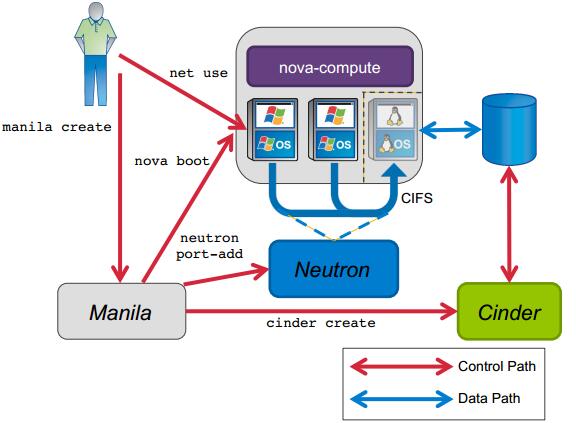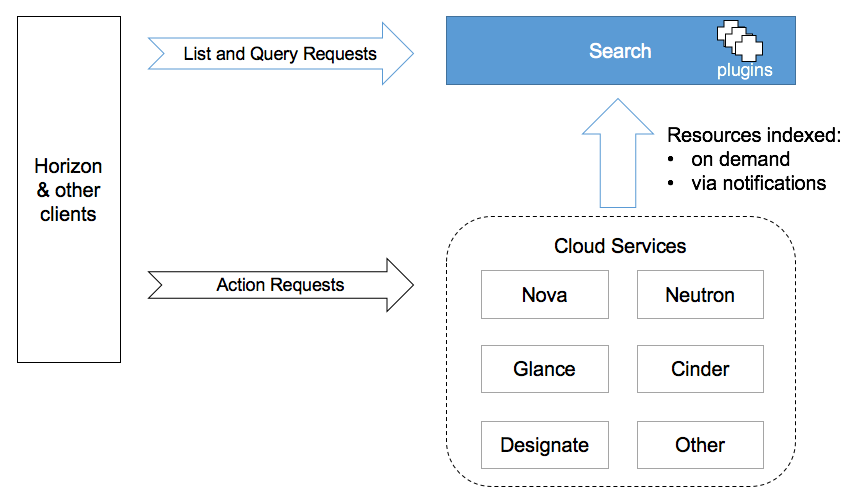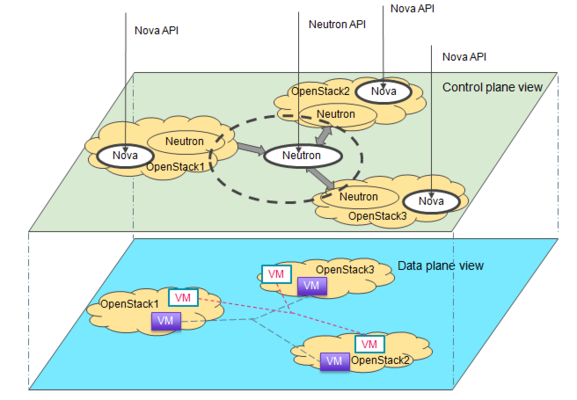aggregates
测试版本:Fuel(9.0.0) openstack(Mitaka)
what’s aggregates in nova
Aggregates是在 OpenStack 的 Regions 和 Availability Zones 之后被提出来,并建立于 Availability Zones 基础之上更进一步划分 computes 节点物理资源的一种机制。
Availability Zones 通常是对 computes 节点上的资源在小的区域内进行逻辑上的分组和隔离。例如在同一个数据中心,我们可以将 Availability Zones 规划到不同的机房,或者在同一机房的几个相邻的机架,从而保障如果某个 Availability Zone 的节点发生故障(如供电系统或网络),而不影响其他的 Availability Zones 上节点运行的虚拟机,通过这种划分来提高 OpenStack 的可用性。目前 OpenStack 默认的安装是把所有的 computes 节点划分到 nova 的 Availability Zone 上。
Host Aggregates 是在 Availability Zones 的基础上更进一步地进行逻辑的分组和隔离。例如我们可以根据不同的 computes 节点的物理硬件配置将具有相同共性的物理资源规划在同一 Host Aggregate 之下,或者根据用户的具体需求将几个 computes 节点规划在具有相同用途的同一 Host Aggregate 之下,通过这样的划分有利于提高 OpenStack 资源的使用效率。使用场景如下:
- 在具有相同物理特性的 computes 节点上创建 Host Aggregate, 比如下面将具有高性能CPU的 computes 节点规划为一组,并将 Host Aggregate 命名为“cpu/xeon-e7”。
- 覆盖nova.conf的配置, eg:ram_allocation_ratio/AggregateRamFilter



az对用户是可见的,aggregates只对程序可见,由nova-scheduler使用。
查看nova源码下的ls scheduler/filters
1
2
3
4
5
6
7
8
9
10
11
12
13
14
15
16
17
18
19
20
21
22
23
24
25
26
| affinity_filter.py
aggregate_image_properties_isolation.py
aggregate_instance_extra_specs.py
aggregate_multitenancy_isolation.py
all_hosts_filter.py
availability_zone_filter.py
compute_capabilities_filter.py
compute_filter.py
core_filter.py
disk_filter.py
exact_core_filter.py
exact_disk_filter.py
exact_ram_filter.py
extra_specs_ops.py
image_props_filter.py
io_ops_filter.py
isolated_hosts_filter.py
json_filter.py
metrics_filter.py
numa_topology_filter.py
num_instances_filter.py
pci_passthrough_filter.py
ram_filter.py
retry_filter.py
trusted_filter.py
type_filter.py
|
1
| nova help | grep 'aggregate |
1
2
3
4
5
6
7
8
9
10
| aggregate-add-host Add the host to the specified aggregate.
aggregate-create Create a new aggregate with the specified
aggregate-delete Delete the aggregate.
aggregate-details Show details of the specified aggregate.
aggregate-list Print a list of all aggregates.
aggregate-remove-host Remove the specified host from the specified
aggregate.
aggregate-set-metadata Update the metadata associated with the
aggregate.
aggregate-update Update the aggregate's name and optionally
|
1
| nova help aggregate-create |
1
2
3
4
5
6
7
| usage: nova aggregate-create <name> [<availability-zone>]
Create a new aggregate with the specified details.
Positional arguments:
<name> Name of aggregate.
<availability-zone> The availability zone of the aggregate (optional).
|
新建一个aggregate
1
| root@node-6:~# nova availability-zone-list |
1
| root@node-6:~# nova service-list |
1
2
3
4
5
| +----+------------------+--------------------+----------+---------+-------+----------------------------+-----------------+
| Id | Binary | Host | Zone | Status | State | Updated_at | Disabled Reason |
+----+------------------+--------------------+----------+---------+-------+----------------------------+-----------------+
| 8 | nova-compute | node-4.suninfo.com | nova | enabled | up | 2017-02-15T03:10:51.000000 | - |
+----+------------------+--------------------+----------+---------+-------+----------------------------+-----------------+
|
1
| root@node-6:~# nova aggregate-create cpu/xeon-e7 nova |
如果没有指定 Availability Zone, OpenStack 会将 Host Aggregate 建在默认的 Availability Zone 下面(如 nova),否则会根据指定的名字来判断是否创建新的 Availability Zone 或使用已经存在的 Availability Zone,同时在此之下创建 Host Aggregate。
1
2
3
4
5
| +----+-------------+-------------------+-------+--------------------------+
| Id | Name | Availability Zone | Hosts | Metadata |
+----+-------------+-------------------+-------+--------------------------+
| 12 | cpu/xeon-e7 | nova | | 'availability_zone=nova' |
+----+-------------+-------------------+-------+--------------------------+
|
1
| root@node-6:~# nova hypervisor-list |
1
2
3
4
5
| +----+---------------------+-------+---------+
| ID | Hypervisor hostname | State | Status |
+----+---------------------+-------+---------+
| 1 | node-4.suninfo.com | up | enabled |
+----+---------------------+-------+---------+
|
1
| root@node-6:~# nova aggregate-add-host cpu/xeon-e7 node-4.suninfo.com |
1
2
3
4
5
6
| Host node-4.suninfo.com has been successfully added for aggregate 12
+----+-------------+-------------------+----------------------+--------------------------+
| Id | Name | Availability Zone | Hosts | Metadata |
+----+-------------+-------------------+----------------------+--------------------------+
| 12 | cpu/xeon-e7 | nova | 'node-4.suninfo.com' | 'availability_zone=nova' |
+----+-------------+-------------------+----------------------+--------------------------+
|
启动vm并指定计算节点,只需要az功能即可实现, az对用户是可见的。如果希望做一些调度优化,那么就需要管理员通过aggregates来实现。
1
| root@node-6:~# nova boot --image 027e7611-c85f-4097-8d66-eab63f620987 --flavor m1.micro --nic net-id=a18d722f-1edf-4e17-a86d-a96c45fcaaaf --availability-zone nova:node-4.suninfo.com az-test-vm |
1
| root@node-6:~# nova aggregate-set-metadata cpu/xeon-e7 cpu=xeon-e7 |
1
2
3
4
5
6
| Metadata has been successfully updated for aggregate 12.
+----+-------------+-------------------+----------------------+-----------------------------------------+
| Id | Name | Availability Zone | Hosts | Metadata |
+----+-------------+-------------------+----------------------+-----------------------------------------+
| 12 | cpu/xeon-e7 | nova | 'node-4.suninfo.com' | 'cpu=xeon-e7', 'availability_zone=nova' |
+----+-------------+-------------------+----------------------+-----------------------------------------+
|
1
| root@node-6:~# nova flavor-create cpu.xeon-e7 auto 4096 10 2 |
1
| root@node-6:~# nova flavor-key cpu.xeon-e7 set aggregate_instance_extra_specs:cpu=xeon-e7 |
1
2
3
4
5
6
7
8
9
10
11
12
13
14
15
| +----------------------------+--------------------------------------+
| Property | Value |
+----------------------------+--------------------------------------+
| OS-FLV-DISABLED:disabled | False |
| OS-FLV-EXT-DATA:ephemeral | 0 |
| disk | 10 |
| extra_specs | {"aggregate_instance_extra_specs:cpu": "xeon-e7"} |
| id | 11224306-e4df-483b-9a1f-5c35c47a5584 |
| name | cpu.xeon-e7 |
| os-flavor-access:is_public | True |
| ram | 4096 |
| rxtx_factor | 1.0 |
| swap | |
| vcpus | 2 |
+----------------------------+--------------------------------------+
|
再创建一个测试用的flavor,规格相同,extra_specs不同
1
| root@node-6:~# nova flavor-create cpu.xeon-e5 auto 4096 10 2 |
1
| root@node-6:~# nova flavor-key cpu.xeon-e5 set aggregate_instance_extra_specs:cpu=xeon-e5 |
测试,通过flavor启动vm
1
| nova boot --image 027e7611-c85f-4097-8d66-eab63f620987 --flavor cpu.xeon-e5 --nic net-id=a18d722f-1edf-4e17-a86d-a96c45fcaaaf aggregate-test-vm |
1
| | 5048dbaf-6d24-4c46-a496-2d670dbb59c8 | aggregate-test-vm | ERROR | - | NOSTATE | |
|
1
| nova boot --image 027e7611-c85f-4097-8d66-eab63f620987 --flavor cpu.xeon-e7 --nic net-id=a18d722f-1edf-4e17-a86d-a96c45fcaaaf aggregate-test-vm |
1
| | 056dba3d-b3a3-409e-a193-35506981c0ef | aggregate-test-vm | ACTIVE | - | Running | admin_internal_net=192.168.111.121 |
|
flavor cpu.xeon-e5的vm创建失败,flavor cpu.xeon-e7的vm创建成功,aggregate生效。
warning
1
| root@node-6:~# nova aggregate-add-host cpu/xeon-e5 node-4.suninfo.com |
ERROR (Conflict): Cannot add host to aggregate 12. Reason: One or more hosts already in availability zone(s) [u’nova’]. (HTTP 409) (Request-ID: req-81aa55b5-0bb2-47e1-89c2-4d64ac9c9a8c)
一个nova-compute节点只能在一个az内,但是可以存在多个aggregate内。
1
| ComputeCapabilitiesFilter |
1
| AggregateInstanceExtraSpecsFilter |
一个计算节点属于多个aggregate,并且具有相同的metadata key,那么这个host的key对应的值为set集合,匹配规则为任一个满足即可。
ATTENTION
- Resize/Migrate时都需要重新scheduler,所以需要避免在高性能物理服务器上的vm调度到普通机器上。
- ComputeCapabilitiesFilter在N版本之前存在bug(#1582589),最好禁用,否则只能用特殊的flavor.metadata key(上面有key格式说明)。N版本已经Fix此bug
REFERENCES:
host-aggregate
gnocchi
see: what is designate

architecture

see: introduction













